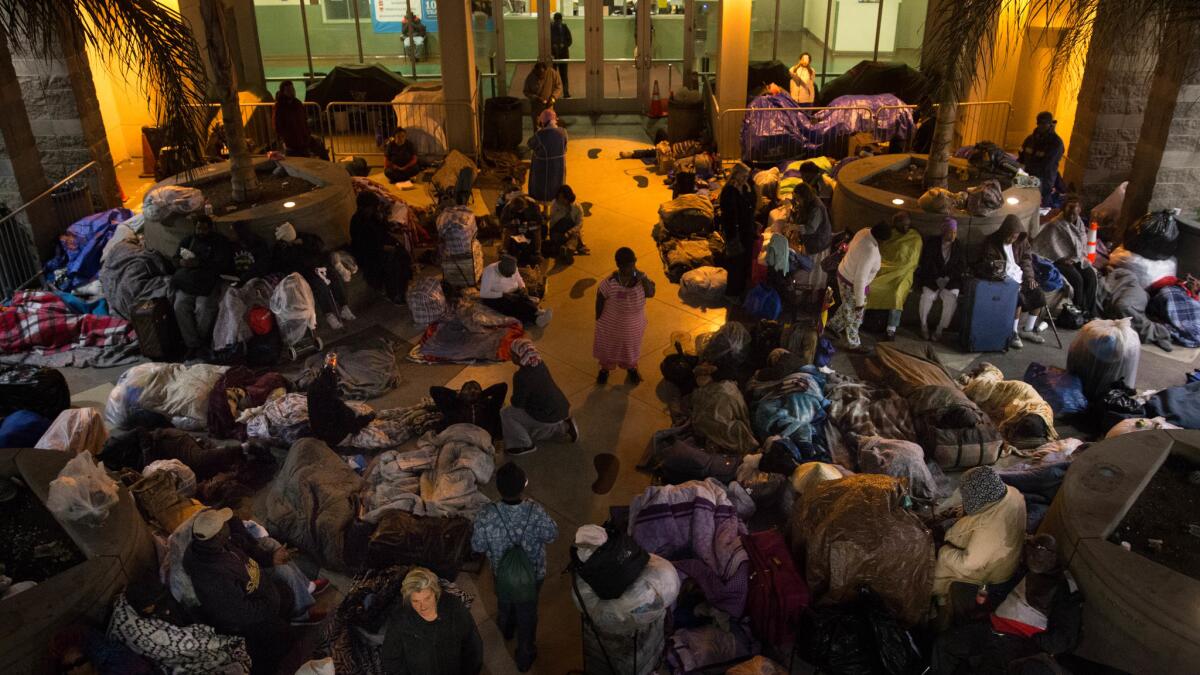Editorial: There’s money for homeless people to rent apartments — but not enough landlords who will take it

- Share via
Housing homeless people can be like fitting together pieces of a jigsaw puzzle — the person must be ready and willing; social workers and therapists must be available if needed to provide services; the money to pay for a rental unit must materialize. And even when all those pieces fall into place, it can still be hard. That’s the predicament right now for more than 2,000 homeless people across Los Angeles County who have money in the form of federal vouchers — but can’t find rental apartments that will accept them.
While officials in Los Angeles hunt for mega-millions to create housing for the county’s nearly 47,000 homeless people, they also have been trying to use more federal aid to put individuals into existing units. City and county housing authorities have dedicated some of the federal housing vouchers for low-income people — known as “Section 8” vouchers — to homeless people who are in case management programs and working toward getting their lives on track again. Officials also got an infusion of housing vouchers from the Department of Housing and Urban Development’s Veterans Affairs Supportive Housing program (shorthanded as “VASH”), which are intended for chronically homeless vets with a mental illness, substance abuse problem or physical disability.
In theory, vouchers let homeless individuals choose where they live, integrate them into communities and get them housed quickly. And they have worked that way in the past. But in a market with steep rental prices and an anemic 2.7% vacancy rate, competition for units is formidable and landlords can be choosy. It doesn’t help that the Section 8 vouchers are capped at $1,269 per month for a one-bedroom apartment in the city of LA. HUD increased the amount that the monthly VASH vouchers are worth to $1,500 for a one-bedroom.
Many landlords complain about the hassles of accepting a tenant on federal assistance, including reams of paperwork and an overbearing inspection process. Also, many landlords fear that a person who has been homeless for years, perhaps struggling with mental illness or an addiction, will be a difficult, disruptive tenant.
But officials now have more incentives to offer landlords who rent to homeless people. Veterans’ security deposits can be covered by local government, as well as the fees to hold a unit until the inspection is done. The Department of Veterans Affairs also promises case managers who closely follow tenants and serve as a 24-7 contact for landlords.
City and county officials have launched similar efforts to make homeless people with Section 8 vouchers more appealing to landlords. In addition to offering security deposits, holding fees and the help of case managers, the county created a fund to cover any damages that tenants might cause.
HUD needs to upgrade the value of Section 8 vouchers. If they don’t closely match market rates, even in modest neighborhoods, they’re essentially worthless.
The biggest advantage for landlords taking in tenants on vouchers is the guaranteed payment of the bulk of the monthly rent by the federal government. But that incentive doesn’t always outweigh concerns about formerly homeless tenants. Some VA and local officials admit that, in the past, case management of voucher holders wasn’t as careful as it should have been.
Now, local officials need to let landlords know that things have changed. For example, if a landlord has a complaint about a tenant that can’t be resolved, case managers will try to move the tenant elsewhere. And vouchers aren’t handed out casually on Skid Row like fast-food meal cards. All the recipients have been evaluated and assigned case managers who have judged them capable of living successfully in apartment buildings even if they also are getting counseling or treatment. That’s no guarantee that a voucher holder won’t become a disruption in an apartment building, but there’s no guarantee that any tenant won’t become a problem. At least these tenants come with a village of service providers.
LA County Supervisor Sheila Kuehl has already held one informational gathering in the San Fernando Valley to court landlords. She plans to do more. That’s a good idea.
City and county officials should also insist that their nonprofit partners have sufficient manpower dedicated just to finding affordable units and forging relationships with landlords. And HUD needs to upgrade the value of Section 8 vouchers. If they don’t closely match market rates, even in modest neighborhoods, they’re essentially worthless.
One promising plan is an agreement that the city and the VA have with developers to convert rundown motel properties into apartments for homeless veterans. The city is providing VASH vouchers for the 500 units of housing that will be created. The VA will provide the case management.
City and county officials were resourceful enough to get these vouchers. They just have to do a better job persuading landlords to take them.
Follow the Opinion section on Twitter @latimesopinion and Facebook
More to Read
A cure for the common opinion
Get thought-provoking perspectives with our weekly newsletter.
You may occasionally receive promotional content from the Los Angeles Times.










